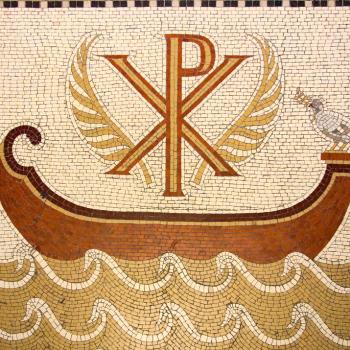
Paul’s belief in Christ had him challenge himself and his own understanding of the way God could and would interact with the Gentiles. It did not change the way he viewed the people of Israel, the Jews, and the special relationship he believed they had with God. Indeed, in some ways, it intensified it, as it made him understand even more how special that relationship was, which is why he didn’t think Gentiles were called to convert to the Christian faith in such a way as to follow all the stipulations and laws established in God’s covenant with Moses. The expectations God had for the people of Israel were for them alone, and through those expectations, God directed Israel and its history, giving them grace after grace, grace which was necessary for Israel to fulfill its destiny, grace which was to bring to the world the messiah, Jesus Christ. That destiny, as the prophets often indicated, had a universal value to it. Israel’s engagement with God would find a way to bring others, the Gentiles, into a relationship with Israel, so that they could and would worship God together, but it didn’t mean that the Gentiles would or should become Jews. With Jesus, God had revealed how the special place for Israel would be preserved, even as everyone else would find themselves included in God’s greater saving providence.
In this manner, Paul would often highlight the greatness of his heritage, pointing out the good he had achieved by embracing it, showing that even as a Christian, he continued to hold the Jewish people and their tradition with great esteem. Paul did not think that his faith in Christ led him to go against his people and their traditions. Rather, he thought that the lessons learned by the people of Israel, especially through their historical relationship with God, could help explain even better the way God could and work with the Gentiles apart from works of the law of Moses. For even the people of Israel were always in need of God’s grace, that is, throughout their history, they were constantly falling short of God’s expectations for them. Instead of abandoning them, God’s providence continued to be at work with them, helping to lift them up and overcome any and all their deficiencies. The history of Israel showed the way God’s grace supplemented and fulfilled what was lacking in the actions of the people of Israel. Paul understood all the failings of the people of Israel, but he also understood, despite them, God made sure the messiah was born among them, and that within the people of Israel, there were raised many great and holy men and women who preserved the grace given to the people of Israel.
Thus, after his embrace of Christ, Paul gained a greater awareness of the value of grace and its role in human history. It was God’s work with Israel which made Israel great. This helped him to see that what was true with Israel, was true with everyone else. Human works, all by themselves, will never be enough. God has to be at work. Our works need to be coordinated with God and God’s grace. When they are, we can have a saving relationship with God. And, one thing Paul really came to understand, is that with Jesus, God’s grace has been offered to all. Jesus shares God’s grace with all humanity, not just the people of Israel, so that even the Gentiles can be saved. It was not mere human works, even if they were “works of the law” which saved the people of Israel and made them great, it was God and their relationship with God. This is why the Gentiles, who were not a part of the Mosaic Covenant, should not be expected to embrace works of the law to be saved. What is important is that they find their proper relationship with God in and through Jesus; that relationship, of course, meant those who follow after Jesus should strive to be holy, should strive to do good and reject evil, but it also meant, when they slip up, Jesus is there to lift them back up. Salvation through grace does not mean sin is permissible; it isn’t. Sin has to be rejected, but that rejection has to be the right kind, one done in and through our relationship with Jesus. It is only in him that we can be crucified to sin and find ourselves living the true life Christ wants for us:
We ourselves, who are Jews by birth and not Gentile sinners, yet who know that a man is not justified by works of the law but through faith in Jesus Christ, even we have believed in Christ Jesus, in order to be justified by faith in Christ, and not by works of the law, because by works of the law shall no one be justified. But if, in our endeavor to be justified in Christ, we ourselves were found to be sinners, is Christ then an agent of sin? Certainly not! But if I build up again those things which I tore down, then I prove myself a transgressor. For I through the law died to the law, that I might live to God. I have been crucified with Christ; it is no longer I who live, but Christ who lives in me; and the life I now live in the flesh I live by faith in the Son of God, who loved me and gave himself for me (Gal. 2:16-20 RSV).
God sowed, and continues to sow, the seed of grace, not just in one place, but throughout all creation. Grace is offered to all. God took a special interest in the people of Israel, for the seed of grace given to them had a special purpose, one which was to help Israel with its place in salvation history. They were God’s chosen so that in and through them, God could reveal many great truths to the world, but also in and through them, God would establish the family line of the messiah, giving them more and more grace, until, at last, when the time was right, the incarnation could take place. The Logos took up that seed and through it, became the God-man. Christ confirms that God’s providence is universal. God wills that all should be saved. God has made sure all have the opportunity and means for salvation. This does not mean that the seed of grace will always find fertile land, for, as Jesus indicated, sometimes it was trodden under foot or devoured, or found itself in unfertile ground:
A sower went out to sow his seed; and as he sowed, some fell along the path, and was trodden under foot, and the birds of the air devoured it. And some fell on the rock; and as it grew up, it withered away, because it had no moisture. And some fell among thorns; and the thorns grew with it and choked it. And some fell into good soil and grew, and yielded a hundredfold.” As he said this, he called out, “He who has ears to hear, let him hear (Lk. 8:5-15 RSV).
The sower, God, continues to sow the seed, so that even ground which once did not take it, still has the chance to properly receive it; this is one of the reasons why we can hope that all might be saved, for just as a farmer does not give up farming due to one bad year, one bad crop, so God does not give up on any one of us. God continues to plant the seed of grace in and with all of us. If we welcome it, if we cooperate with it, it will not be trodden under foot nor destroyed by outside influences; rather it will be planted deep in us, merge with us, and bring us to the holiness which God wants for us. Thus, while the Gentiles might not have always had as much fertile ground for grace as the people of Israel did, the seed was planted with them even as it was planted with the people of Israel. They are not expected to become Jews themselves, but rather, to embrace the grace given to them in their own particular situation and context, to develop their own special relationship with God. This is what Paul had to come to understand, and once he did, he was able to become the great preacher to the Gentiles, because he respected them and their difference while still affirming the greatness he believed was found with his own people.
Stay in touch! Like A Little Bit of Nothing on Facebook.
If you liked what you read, please consider sharing it with your friends and family!

















